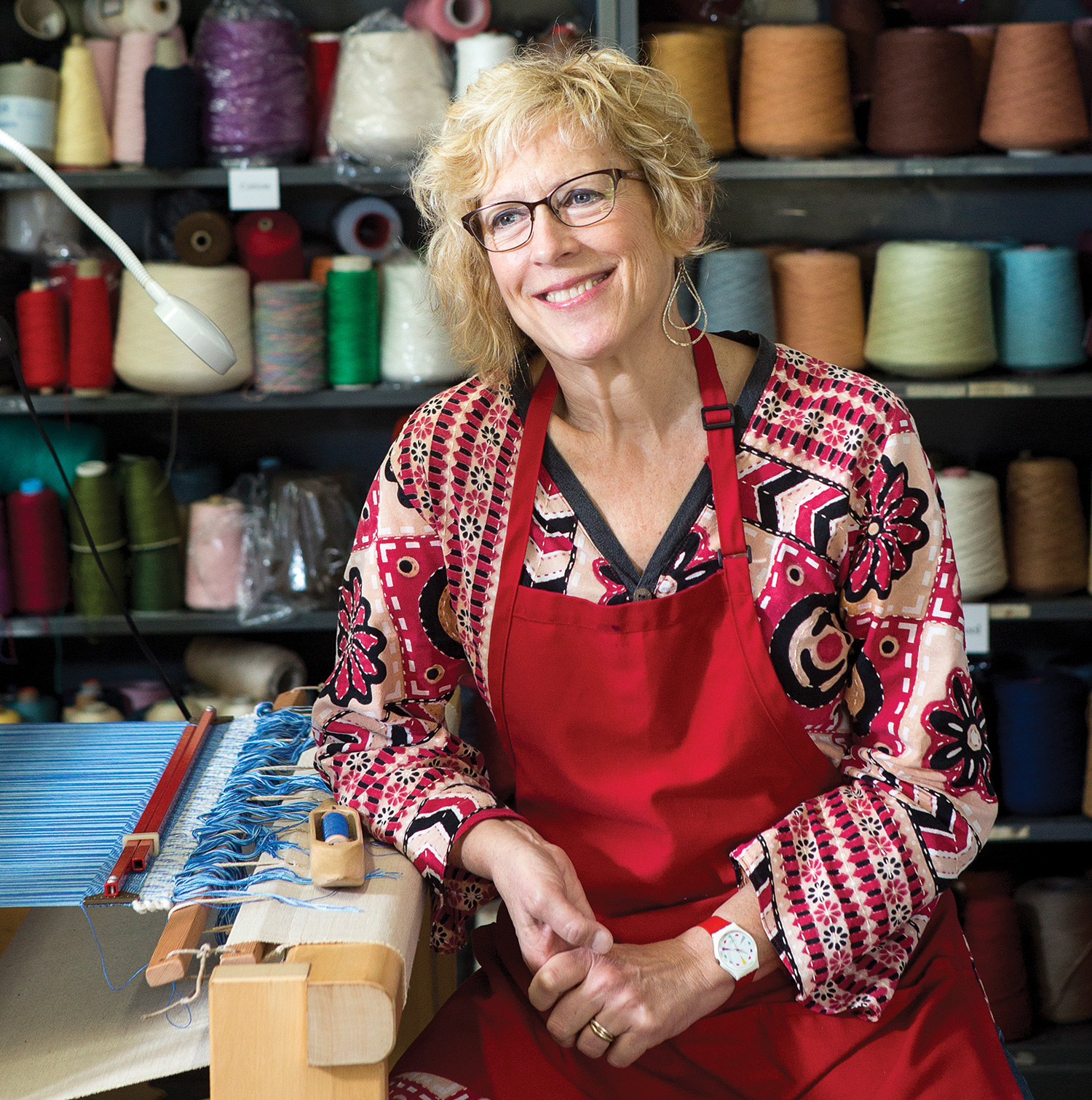
Mary Jo Lanik left behind corporate culture and followed a hands-on dream south to Hendersonville. Now she is surrounded by countless skeins of yarn instead of skyscrapers. Photo by Matt Rose
MaryJo Lanik imagined her break from corporate culture as being more romantic. She and her husband David, both weary from four-hour round-trip commutes to Manhattan, would leave Upstate New York to open a fiber-processing mill in Nova Scotia. Their homestead would overlook the wild and beautiful Bay of Fundy and smell of dirty raw fleece — a lingering suggestion of sweet hay. Outhouses had already been constructed around their remote future textile mill; the machinery from Rhode Island was on order.
But in the mid-2000s, the plan went south. With two ill parents residing in North Carolina, Lanik gave up on her Canadian dream and relocated to Hendersonville. “I had to tell David that we couldn’t go to Canada — family comes first,” Lanik says. “I expected divorce, to be honest.”
Fortunately, rather than soured matrimony, she was met with what she calls a “vortex of creative energy.” It was no Halifax, but the Blue Ridge delivered in the form of spinners and looms, hand weavers and guilds. Everything fell into place, including community, and in September 2011, Lanik established The Wool Room, a fiber-arts supply store in Hendersonville.
“I went with a leap of faith,” she reflects. “And it felt right as rain.”

Photo by Matt Rose
The brick-and-mortar may not be as avant-garde as the initial vision: little can eclipse wooded acres complete with flock and shepherd. Yet the shop still gestures to a shift in pace. Ablaze with symphonic hues of “roving” (an insider term for brushed un-spun fiber), the shelves mark a bright contrast to earlier years that were tempered by pragmatism. In her 20s, Lanik joined the military and attended secretarial school.
Administrative positions in philanthropy and marketing afforded her lifestyle, but something was missing. “I always felt I was an artist,” she says. However, her father, now deceased, had pushed for a more sensible career, declaring, “‘I’m not sending you to art school … you’ll starve.’”
Decades later, it was her tactile needs that were starving, thanks to many seasons of shorthand and long train rides, until she revisited the urge to create. Her mind wandered to a cramped house in the Bronx where her grandmother had used a handheld loom. Small woolen squares would grow into blankets for grandchildren. “I was fascinated by that,” she says.
When piles of cotton and rayon and bamboo began filling Lanik’s cabin, a quaint setup 75 miles north of New York City, a friend suggested she take classes at The Weaving Center of Marymount College, founded in Tarrytown.
It made her “heart sing.” The loom’s mechanical nature — the slow, methodical act of tying off and dressing its many moving parts — felt so very Zen. “I don’t mean to be corny,” Lanik says apologetically. “But it’s my happiest place.” Several years later, after noting her parents’ deteriorating health, she bid farewell to corporate culture for good.
In Hendersonville, the specter of high rises were replaced by the lazy bend of the French Broad River. Today, Lanik assembles needle-felted broaches instead of fiscal reports, and strikes deals in the open air — i.e., with Shetland-sheep farmers in Mills River. It’s an unhurried life, even quixotic, although considering the surge in big-box craft stores (WNC recently got its first Hobby Lobby), running a small, independent fiber-arts supply shop is also a bold move.
Specialization is key. “I’m not trying to be everything,” Lanik says. She forgoes China-made textiles and sets her own dyes with vinegar, not chemicals. Her shop appeals to purist-type makers: she outfits weavers with old-school oak “niddy-noddies” — a tool used to make skeins of yarn — and classic Maysville cotton. There’s an emphasis on unique products and inclusivity — a stark contrast to the synth-blend potholders and commercially processed wools of the late 20th century.
“It’s not just acrylics at Woolworth anymore,” quips Lanik, referencing a flash of her Long Island upbringing. Grandmothers still weave; so do back-to-the-landers of various generations. But it’s no longer a marginal undertaking. Kids learn it, crafters live by it — and as for corporate professionals with long-submerged dreams, well, they just tend to step on the loom pedal more firmly.
“The past gets you to where you are today,” says Lanik.
The Wool Room (630 Boxcar Street in Hendersonville) is open Tuesday through Saturday, 10am-5pm. Look for more information at www.woolroom.com or call 828-692-7373.
